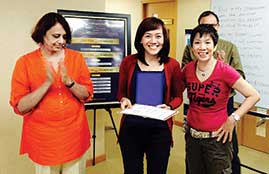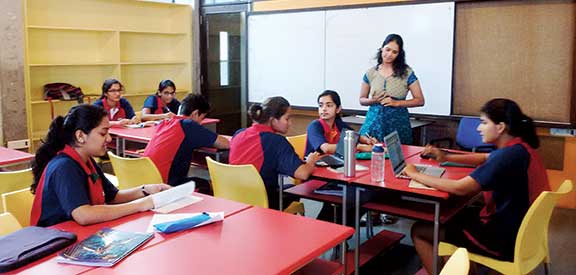Mehak Siddiqui
For retired school principal Tony de Sa, teaching was something that happened by chance, the result of a casual conversation with a friend at a little café in the quaint town of Mapusa, during his college days.
In the 39 years since, de Sa has done much more than teach, from managing school administration to editing the in-house magazine of the Goa Headmasters Association, and finally learning computer programming on his own. He now edits for a Noida-based computers magazine while participating in the social affairs of his village in Goa.
“My romance with computers is a long standing one,” says de Sa. “It began with our school getting computers under the MPLAD (Member of Parliament Local Area Development) scheme in the early nineties. On the day we got them, I could barely turn them on and off. This irritated me and so that very day, I went to Panjim, the capital city of Goa, and found a book which would teach me the basics of Word Star and Lotus 1-2-3. Yes, there was no Microsoft Word or Excel in those days!” he recounts.
Today, teachers of every age are building unique career paths that combine their love for teaching with their varied personal interests and skills. For those who want to transition from teaching children to mentoring adults, corporate training is a popular option. After several fulfilling years in the education sector, Chennai-based Sheela Sanjeevi ventured into conducting positivity and leadership workshops for young adults and corporate employees.
“I never consciously planned the change in my career but it was rather a result of the opportunities that presented themselves,” says Sanjeevi. “I love teaching, but I was never a teacher-teacher. I was always a learner first, which enables me to relate better with people and help them open up and express themselves,” she adds.

“It’s both my passion and my calling to empower people to respond positively to life situations in order to grow as individuals. I grew up imbibing a positive attitude from my parents and this has shaped the work that I do,” says Sanjeevi, who is also a published author. She is currently working on her second book related to parenting. Her first, called Appa’s Ways was published earlier this year by Partridge Publishing.
For many other educators, opportunities beyond traditional teaching involve coaching students in innovative co-curricular programmes aimed at fostering creativity. Now in her 30th year of teaching, Lily Goenka runs an innovative language arts programme called Explorations at the Hiranandani Foundation School in Mumbai. Aimed at igniting and nurturing the curiosity of students from kindergarten to grade nine, Explorations uses music, art, stories, poetry, and drama to help children read, write, and explore the world around them with a sense of joy and wonder.
“What is most rewarding for me is being able to teach what I’m passionate about, be it an exposure to world writers, great composers, or great artists,” says Goenka, who has been involved with the programme for the past 18 years.
Similarly, Mumbai-based Dheera Kitchlu runs Anyone Can Write, an initiative that encourages children to explore their creative potential through writing. Through mentoring students one-to-one, free of cost, Kitchlu published the first Anyone Can Write book in 2013, featuring 55 writings by children and adolescents from across the country.
“There is no such thing as right and wrong in story writing,” asserts Kitchlu. “If we let children express what they imagine rather than what we expect them to write, we will to an extent be able to nurture creativity and free thinking,” she says.
The author of over 10 books for children, Kitchlu began telling stories in her 30s, while teaching at a nursery school in Mumbai. It was also around the same time that she first learned about her dyslexia, after years of contending with this learning difficulty on her own.
“The discovery liberated me and opened up the flood gates of creativity because the ‘Unknown’ had suddenly become known,” shares Kitchlu. “Academics for me were difficult and bewildering, and the knowledge that there was a reason for my ‘slowness’ gave me the fillip I required to let the juices flow,” she recounts.
Apart from writing, Kitchlu dabbles in art, donating the proceeds from all sales to charity organizations. She knits soft toys and blankets for hospitals and orphanages, and has contributed to the audio library of the National Association for the Blind.
The multitalented Kitchlu believes that “Creativity should be a way of life, a freedom everyone must be encouraged to enjoy.” At the same time, she asserts that this is in no way restricted to the arts: “Being creative extends to all disciplines like science, math, politics. The teacher has to create a classroom atmosphere which is safe, where children can make mistakes, ask questions and wonder,” she says.
A young educator who is doing just this is 29-year-old Smruti Chaudhari, who teaches English and French as part of the International Baccalaureate (IB) diploma programme at the Fountainhead School in Surat.
“In the IB system, we have a CAS (Creativity, Activity, Service) component for which I try to encourage my students to create videos that could serve learning French across the world,” shares Chaudhari, who is a strong advocate of innovative, enjoyable learning processes.
With two master’s degrees, in English and French literature, along with an advanced diploma in German, Chaudhari has extensive experience of language learning. She has also taught at the Maharaja Sayajirao University in Vadodara, and spent seven months teaching English at the Lycee Raoul Follereau in Belfort, France.
“Language learning involves a lot of hands-on experiential learning and the greatest difficulty is to create an environment that induces learners to immerse themselves in the language,” she says. “We are often so influenced by our first language that we have a tendency to translate and fit foreign languages into our current scheme of things. When this does not happen, learning tends to be a challenge.”
At Fountainhead School since 2014, Chaudhari is also an official examiner for the French ab initio course.
“This is quite an opportunity to know the language even better in terms of how learners respond to questions and what their learning experience has been like,” she reflects.
Aiming to some day work in translation and travel the world, experiencing more languages, Chaudhari finds deeps fulfilment in her current journey as a teacher.
“As I acquire expertise in the IB system, I am looking at volunteering as a workshop facilitator to share my knowledge and ensure that the teaching community benefits from the same,” she shares.

Her commitment to her profession reflects in the multitude of roles she takes on. She has recently been appointed as an assistant team leader for the Theory of Knowledge course, a position that involves collaborative planning and the development of innovative classroom techniques that can make learning more enjoyable and productive for students.
“The theory of knowledge is similar to a basic philosophy course,” explains Satish Kumar B, another IB teacher who enjoys going beyond conventional classroom instruction at the Chinmaya International Residential School.
“Each week, we delve into a different subject to explore their distinct methods of gaining knowledge. This makes it possible to use a variety of learning methods and activities,” says Kumar.
During a particular session dedicated to understanding the concepts of physics, Kumar demonstrated projectile motion by having students emulate the popular cell phone game, Angry Birds. “Not only was it fun for the students but they were able to clearly see a scientific theory in action, which strengthens their understanding of it.”
Apart from teaching physics, Kumar is also involved in the Chinmaya Vision Programme that fuses academics with Vedantic philosophy in order to foster holistic development.
“Within the classroom, it’s primarily intellectual development that takes place but emotional and spiritual development is equally important, particularly in today’s fast-paced and demanding world,” says Kumar.
This sentiment is echoed by Lily Goenka, who also coaches students for the Speech and Drama and Communication Skills examinations of the Trinity College of London.
“The communication skills examination helps children develop their listening skills and encourages them to communicate with empathy and clarity. In today’s world, I think this is the need of the hour, where we are hearing but not listening to one another,” says Goenka.
With their knowledge about learning and development, high levels of creativity, and experience of dealing with difficult situations, teachers today have a repertoire of very marketable skills, which makes it easy to explore career opportunities beyond traditional classroom teaching.
As Goenka further adds, “The Internet has created endless possibilities in teaching, what with MOOCs (Massive Open Online Courses) and various online interfaces. This is all wonderful but it can never replace face to face teaching.”
At the same time, the Internet can be a way of upgrading one’s skills too, as is evident in the case of Tony de Sa, who relied on websites such as YouTube and Coursera to learn computer programming.
De Sa appreciates the power of technology to transform education: “With devices becoming cheaper and governments willing to spend more on technology, the lecture method is bound to become obsolete. The future will see even more PowerPoint presentations, more learning software, and more audio-video entering our classrooms. Digital whiteboards will become commonplace.”
For those who want to exit the classroom altogether, private tutoring, whether in person or online, is a viable option that offers the work-life balance that is often difficult to find in a school setting.
In all, the skill set of a teacher can be useful and applicable to a variety of professions. And as for the reward, “You may or not become a millionaire,” says Goenka. “But you will always be young and always be rich: young at heart and rich in spirit.”
The author is a writer based in Ahmedabad. She blogs at
